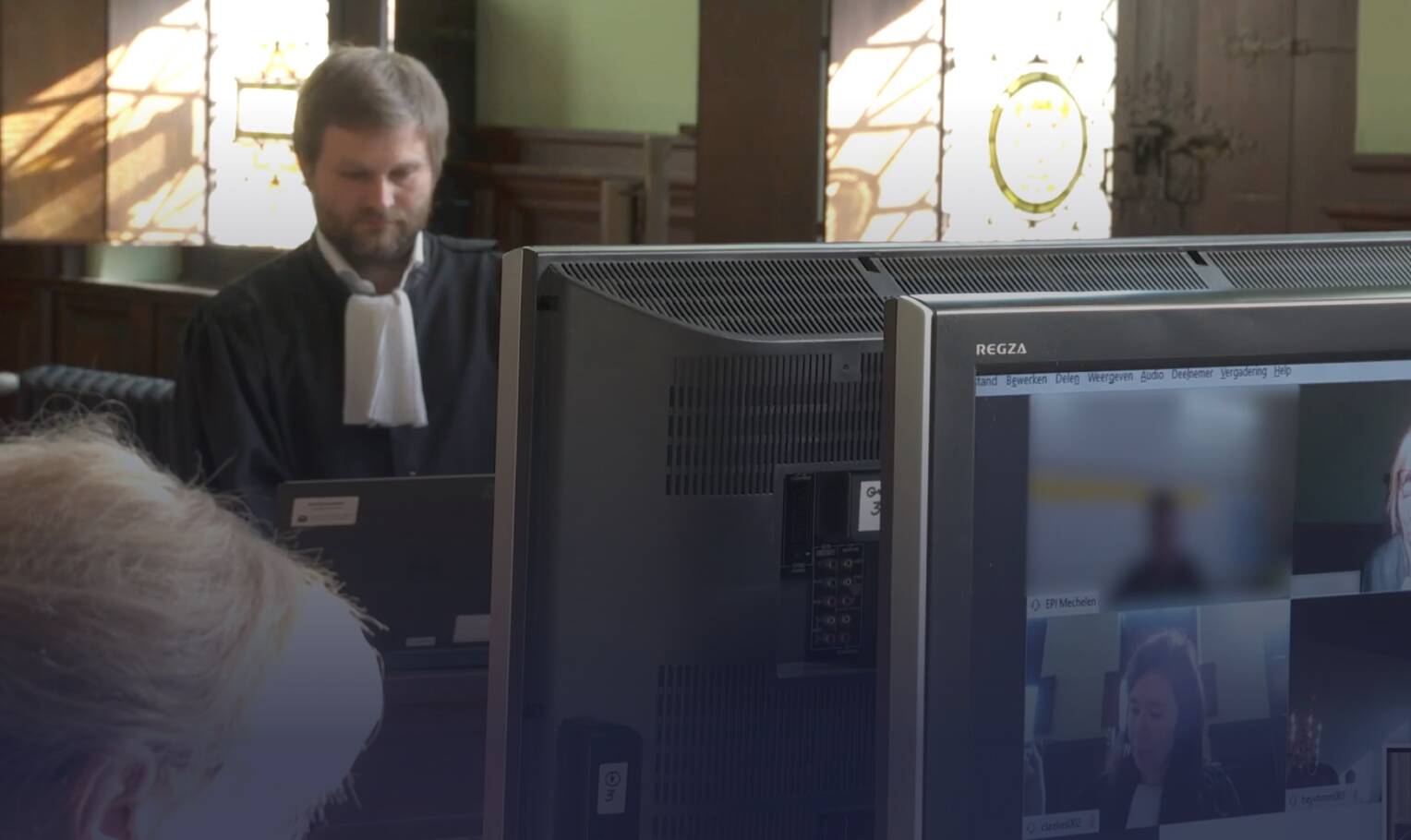
next normal
Hybrid working
people and results
allows for a focus on
According to Isabel De Clercq, hybrid working is not about office and homeworking days, but about creating a people-, client- and results-centered framework. In her manifesto, she has outlined how a business can define this context.
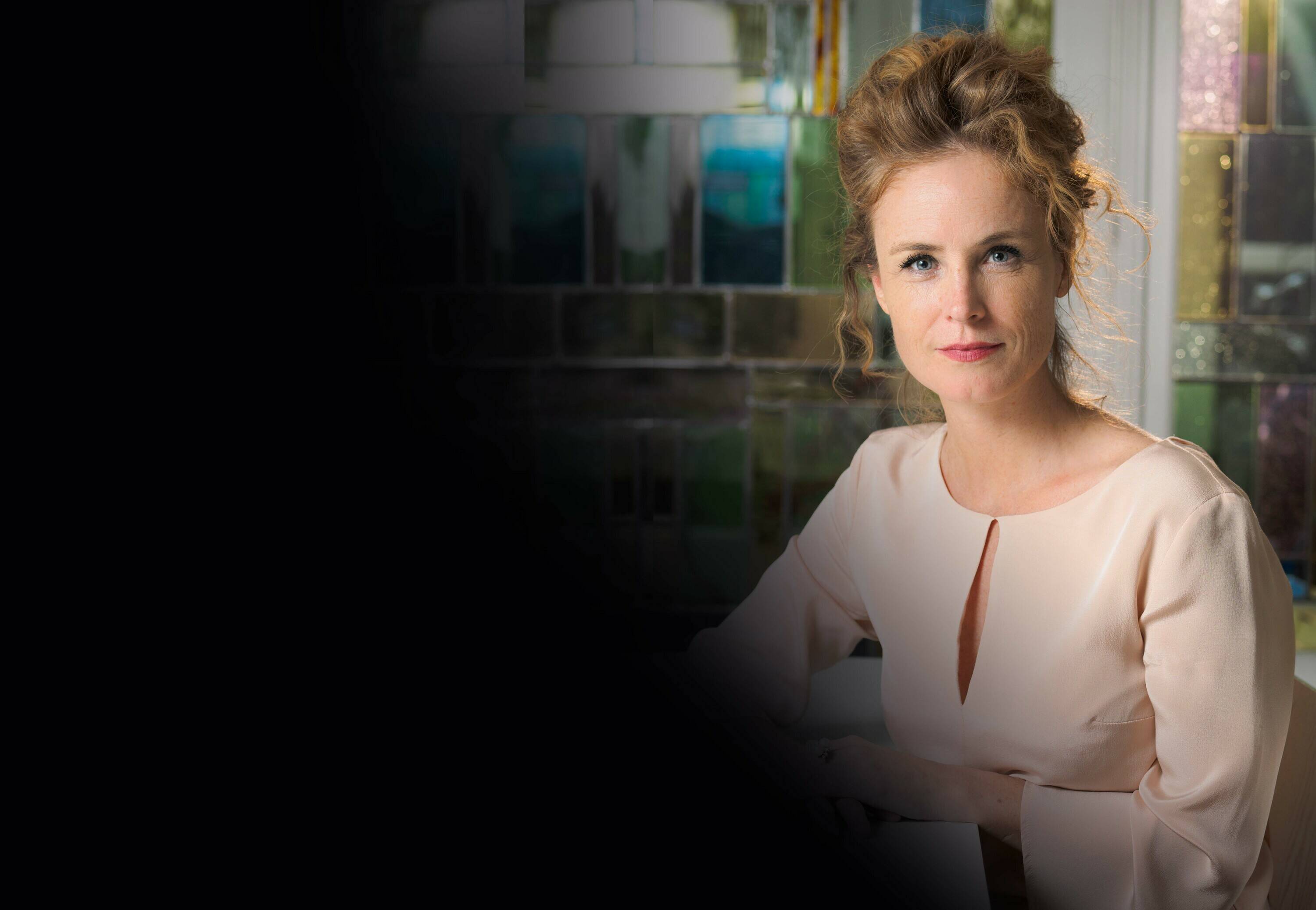
In her manifesto, Isabel makes a case for focus time and asynchronous working. “We see meetings as the only way to work together. But there are other options too: non-simultaneous collaboration is also possible.” Isabel explains: “It is best to keep meetings for those activities that require simultaneous presence. Making a decision, for example. But going through information, forming an opinion and expressing it in words can also be done in advance, in an asynchronous way.” This way of working guarantees that more focus time is released, a necessary condition for being able to do meaningful knowledge work.
4.Institutionalize focus time
Employees do not always have to be reachable and managers do not have to check whether people are at work.
2.Get rid of
‘one size fits all’
Different roles come with different requirements. Allow differences between individuals and teams to exist. This is evidence of a people-centred view.
1. No strict rules, but ‘guiding principles’
Frontloading general guidelines indicates confidence in the strength of the team. The organization attaches importance to a mature employment relationship.
Isabel De Clercq
author of ‘Hybrid Work – A Manifesto.’
“The choices that organizations are making now are an externalization of the values of the organization.”

3. We are still searching…
The path to hybrid work looks different for each organization and involves a constant quest. Be honest enough to admit that.
Isabel De Clercq
Besides being founder of Connect Share Lead, she is also the author of ‘Hybrid Work – A Manifesto’, the management book ‘Social Technologies in Business’ and of the collection of short stories entitled ‘Gekruld [Curly]’.
Seven indicators show that organizations are embracing hybrid working
Asynchronous collaboration and focus time
“Not everyone has to work simultaneously or at
the same location all the time.”
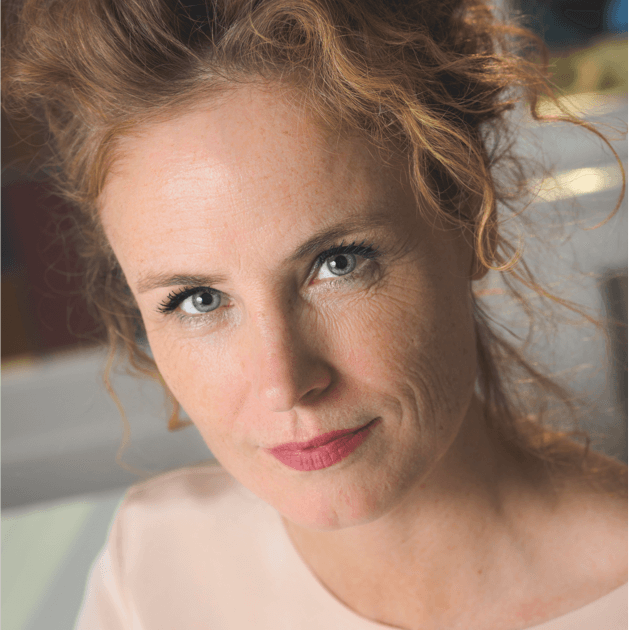

5. Getting started with asynchronous
Working asynchronously leads to fewer interruptions and signals, to knowledge workers, that the organization attaches importance to the fact that they can end their day with a satisfied feeling.
6.Lifelong learning
Encourage employees to continue to extend themselves. Support them in their ambitions.
“Hybrid working is often presented as the ultimate freedom for the individual. But that is not at all what it is. Think of the Holy Trinity: individual, team and organization. The individual must consciously consider the way in which he or she creates added value. Managers should pay more attention to establishing connection and trust. Finally, the organization must provide clear guidelines: general principles that allow teams to make agreements within them and agree on good ways of interacting.”

Isabel De Clercq is founder of Connect Share Lead, which helps organizations shape a healthy workplace. Hybrid working is an interesting facilitator in this regard. “From lifelong learning and asynchronous knowledge sharing, through productivity, focus and technology, to digital language and greater self-determination. Those who set up hybrid working optimally win in all areas and also conduce to better customer service.”
Individual – team – organization: the Holy Trinity
Too much regulation, too little vision
Isabel sees organizations reacting frantically when preparing for what is to come in the autumn. “It's as though many of them feel obliged to jump on that bandwagon. The debate is often narrowed down to establishing two days of homeworking. By doing this, organizations are ignoring the rich ideas contained in hybrid working.” Isabel then fervently refers to concepts such as trust, mature work organization, customer focus and lifelong learning.
Switch to hybrid working
Answer the questions for a chance to win one of three copies.
‘Hybrid Work’ by Isabel De Clercq
Take part and win!
Win the book
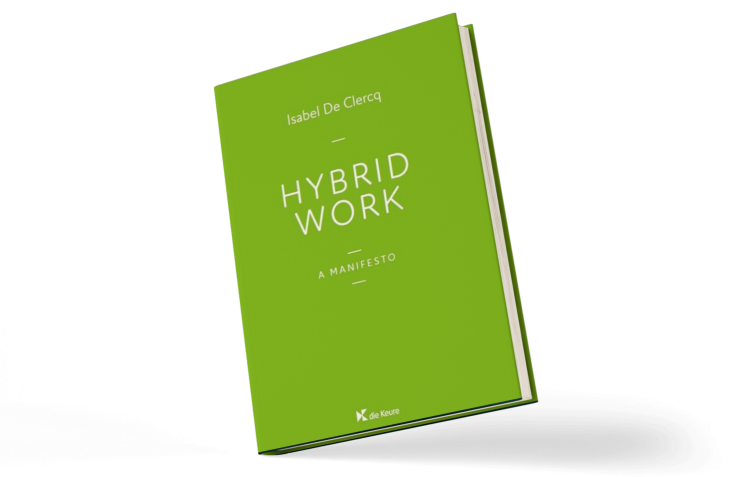
7. Set the tone as a manager
Executives who are present in the office full-time give off the signal that the office is the central place of power. In hybrid working, all workplaces are equal.

Online leadership, motivation and connection
“The pandemic and ongoing working from home have made it difficult to maintain a healthy work-life balance for a long time now. That's why we now mainly work on 'Work smarter', 'Connect together' & 'Energize yourself'. We provide tips, webinars, videos and guidance about ways to relax and meet smarter.”
Erica Baetslé,
HR Manager Wellbeing & Engagement at Proximus

- Eric De Ron
- Steven Ackx
- Alain Dumont
- Nele Warnez
- Koan Van Echelpoel
- Luc Stock
These winners of the competition in our June edition of One received the book "5G: The backbone of our future" by Tom Cassauwers or Guy Pujolle’s book "Should we be afraid of 5G?".
people and results
According to Isabel De Clercq, hybrid working is not about office and homeworking days, but about creating a people-, client- and results-centered framework. In her manifesto, she has outlined how a business can define this context.
allows for a focus on
Hybrid working
next normal
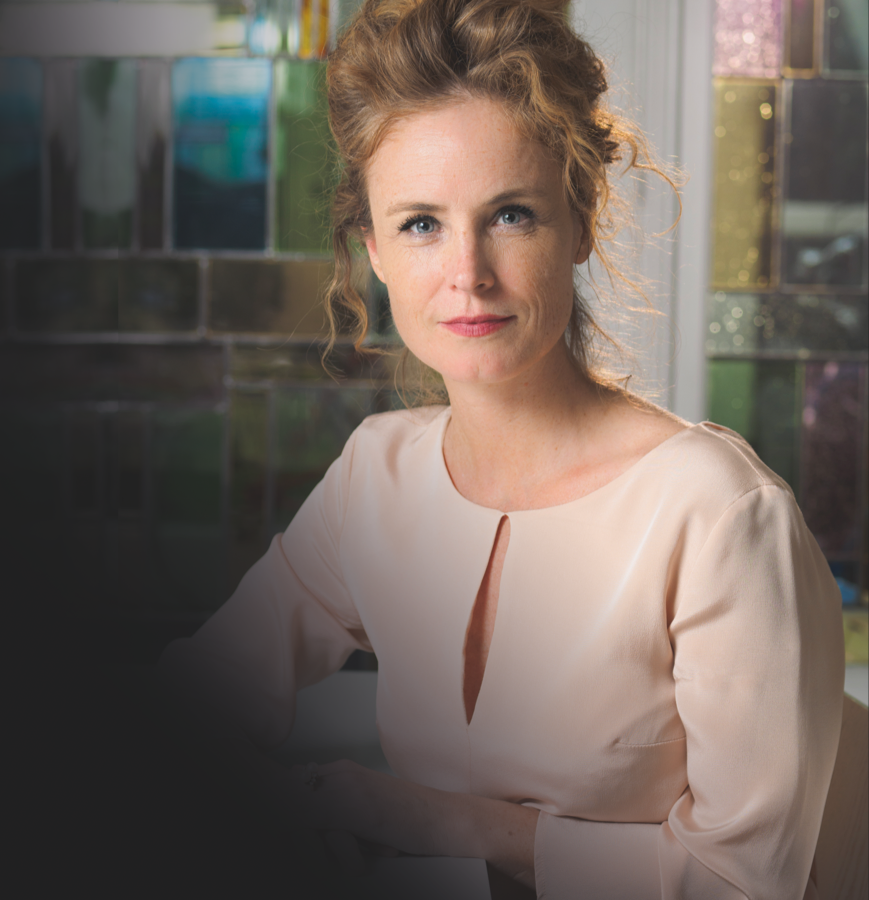
5. Getting started with asynchronous
Employees do not always have to be reachable and managers do not have to check whether people are at work.
4.Institutionalize focus time
The path to hybrid work looks different for each organization and involves a constant quest. Be honest enough to admit that.
3. We are still searching…
Different roles come with different requirements. Allow differences between individuals and teams to exist. This is evidence of a people-centred view.
2.Get rid of
‘one size fits all’
Frontloading general guidelines indicates confidence in the strength of the team. The organization attaches importance to a mature employment relationship.
1. No strict rules, but ‘guiding principles’
6.Lifelong learning

Seven indicators show that organizations are embracing hybrid working
“Not everyone has to work simultaneously or at the same location all of the time.”

In her manifesto, Isabel makes a case for focus time and asynchronous working. “We see meetings as the only way to work together. But there are other options too: non-simultaneous collaboration is also possible.” Isabel explains: “It is best to keep meetings for those activities that require simultaneous presence. Making a decision, for example. But going through information, forming an opinion and expressing it in words can also be done in advance, in an asynchronous way.” This way of working guarantees that more focus time is released, a necessary condition for being able to do meaningful knowledge work.
Asynchronous collaboration and
focus time
“Hybrid working is often presented as the ultimate freedom for the individual. But that is not at all what it is. Think of the Holy Trinity: individual, team and organization. The individual must consciously consider the way in which he or she creates added value. Managers should pay more attention to establishing connection and trust. Finally, the organization must provide clear guidelines: general principles that allow teams to make agreements within them and agree on good ways of interacting.”
Individual – team – organization:
the Holy Trinity
Working asynchronously leads to fewer interruptions and signals, to knowledge workers, that the organization attaches importance to the fact that they can end their day with a satisfied feeling.
Encourage employees to continue to extend themselves. Support them in their ambitions.
Switch to hybrid working
These winners of the competition in our June edition of One received the book "5G: The backbone of our future" by Tom Cassauwers or Guy Pujolle’s book "Should we be afraid of 5G?".
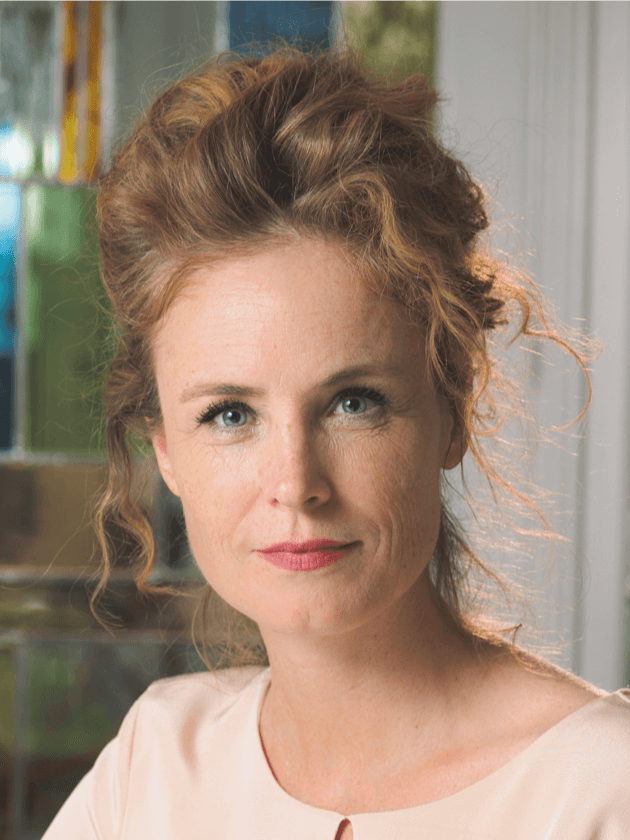
Isabel De Clercq
Besides being founder of Connect Share Lead, she is also the author of ‘Hybrid Work – A Manifesto’, the management book ‘Social Technologies in Business’ and of the collection of short stories entitled ‘Gekruld [Curly]’.
Erica Baetslé,
HR Manager Wellbeing & Engagement at Proximus

“The pandemic and ongoing working from home have made it difficult to maintain a healthy work-life balance for a long time now. That's why we now mainly work on 'Work smarter', 'Connect together' & 'Energize yourself'. We provide tips, webinars, videos and guidance about ways to relax and meet smarter.”
Online leadership, motivation and connection

- Eric De Ron
- Steven Ackx
- Alain Dumont
- Nele Warnez
- Koan Van Echelpoel
- Luc Stock
7. Set the tone as a manager
Take part and win!
Answer the questions for a chance to win one of three copies.
‘Hybrid Work’ by Isabel De Clercq
Win the book
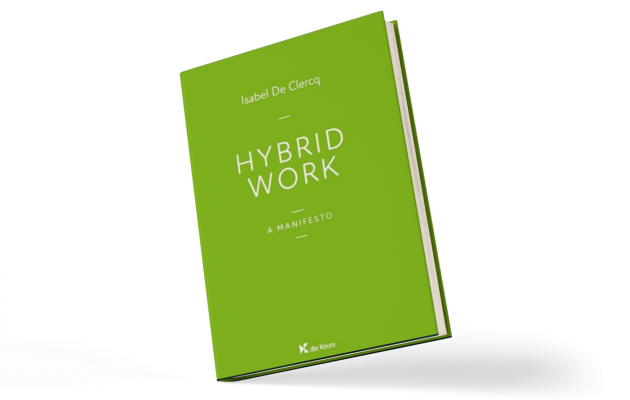
Isabel De Clercq
author of ‘Hybrid Work – A Manifesto.’
“The choices that organizations are making now are an externalization of the values of the organization.”
Executives who are present in the office full-time give off the signal that the office is the central place of power. In hybrid working, all workplaces are equal.
Too much regulation, too little vision
Isabel De Clercq is founder of Connect Share Lead, which helps organizations shape a healthy workplace. Hybrid working is an interesting facilitator in this regard. “From lifelong learning and asynchronous knowledge sharing, through productivity, focus and technology, to digital language and greater self-determination. Those who set up hybrid working optimally win in all areas and also conduce to better customer service.”
Isabel sees organizations reacting frantically when preparing for what is to come in the autumn. “It's as though many of them feel obliged to jump on that bandwagon. The debate is often narrowed down to establishing two days of homeworking. By doing this, organizations are ignoring the rich ideas contained in hybrid working.” Isabel then fervently refers to concepts such as trust, mature work organization, customer focus and lifelong learning.
